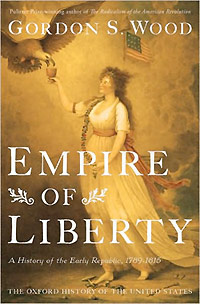Gordon Wood’s Otherwise Fantastic Empire of Liberty Weirdly Skips the Slaughter at Fort Dearborn
 |
BOOKS You wouldn’t expect Chicago to figure prominently in a book called Empire of Liberty: A History of the Early Republic, 1789-1815. And indeed the book—the latest entry in the Oxford History of the United States—frequently looks eastward as Washington, Jefferson, et al. strive to form a cohesive nation under their new Constitution’s aegis. (Dr. Benjamin Rush, the eponym behind Chicago’s Rush Medical Center, emerges as a republican—little R—polymath.) But Gordon Wood, the author of Empire of Liberty and a professor emeritus at Brown University, misses two tantalizing opportunities to weave Chicago into his narrative, which also tracks the country’s expansion into the trans-Appalachian west.
Discussing the 1795 Treaty of Greenville, Wood notes that Native Americans ceded much of modern-day Ohio, as well as land near Vincennes, Indiana. There is even a lovely map depicting the ceded lands. That map galls, showing, as it does, the southern reaches of Lake Michigan with absolutely no indication (or mention in the text) that the treaty also surrendered six square miles at the mouth of the Chicago River.
Fort Dearborn, of course, would soon occupy that strategic site, and we all know what happened there, right? Maybe not. Regarding the opening months of the War of 1812, Wood recounts how the commanding general on the U.S. frontier “believed that Fort Dearborn at the present site of Chicago could not be held, and he ordered its evacuation, which eventually took place on August 15th.” That’s it—no mention at all of the slaughter that immediately followed the fort’s evacuation. (The map for the 1812 war notes Fort Dearborn but doesn’t give it the exploding black icon that depicts a battle site). These are small quibbles about a splendid book, but the omission of Chicago, even in its decidedly minor role, stings.
GOOD, RELATED LINKS
- The New York Times review: “On every page of this book, Wood’s subtlety and erudition show. Grand in scope and a landmark achievement of scholarship, Empire of Liberty is a tour de force, the culmination of a lifetime of brilliant thinking and writing.”
- The Washington Post review: “Wood, who is chiefly a political and intellectual historian, has a particular knack for writing books with the magisterial sweep of the other volumes in the Oxford History series. Empire of Liberty will rightly take its place among the authoritative volumes in this important and influential series, but it is not likely to stir readers yearning for a fresh interpretation of the period.”
- The American History Book Prize announcement: “In Empire of Liberty, an immense and immensely readable summing-up of a lifetime’s thinking and research, Gordon Wood shows how a generation of American leaders laid the foundations for our national institutions, amid the pressures of partisan politics and ever-increasing democratization. The America we discover in his book is both vivid in itself and compelling in what it suggests about our nation today.”
- What Wood missed, from Geoff Johnson’s feature story about Fort Dearborn from the December 2009 issue of Chicago.
- An antidote for Wood’s oversight: Donald Miller’s City of the Century: The Epic of Chicago and the Making of America.


